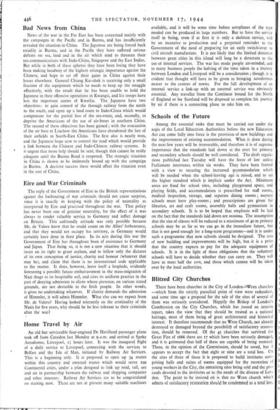Bad News from China
News of the war in the Far East has been concerned mainly with the campaigns in the Pacific and in Burma, and has insufficiently revealed the situation in China. The Japanese are being forced back steadily in Burma, and in the Pacific they have suffered serious defeats on sea, land and in the air which tend to threaten their sea-communications with Indo-China, Singapore and the East Indies. But while in both of these spheres they have been losing they have been making headway of the highest strategic importance against the Chinese, and hope to set off their gains in China against their losses elsewhere. General Chiang Kai-shek is receiving only a small fraction of the equipment which he needs to keep up the struggle effectively, with the result that he has been unable to hold the Japanese in their offensive operations in Kwangsi, and his troops have lost the important centre of Kweilin. The Japanese have two objectives: to gain control of the through railway from the north to the south, and open up a land route to Indo-China which would compensate for the partial loss of the sea-route, and, secondly, to deprive the Americans of the use of air-bases in southern China. The second of these objectives has been gained ; with the evacuation of the air base at Liuchow the Americans have abandoned the last of their airfields in South-East China. The first also is nearly won, and the Japanese hope now to control the road which would provide a link between the Chinese and Indo-Chinese railway systems. It is urgent that more help should be sent, though this cannot be really adequate until the Burma Road is reopened. The strategic situation in China is shown to be intimately bound up with the campaign in Burma. A decisive success there would affect the situation even in the east of China.


























 Previous page
Previous page